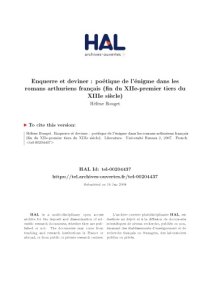
Ebook: Enquerre et deviner : poétique de l’énigme dans les romans arthuriens français (fin du XIIe-premier tiers du XIIIe siècle
Author: Bouget Hélène
- Genre: Literature
- Tags: Romans de la Table ronde -- Critique et interprétation -- Thèses et écrits académiques, Devinettes et énigmes -- Dans la littérature -- Thèses et écrits académiques, Littérature courtoise française -- 13e siècle -- Thèmes motifs -- Thèses et écrits académiques, Roman courtois français -- Thèses et écrits académiques, Roman d’énigme -- France -- 12e siècle -- Thèses et écrits académiques, Roman d’énigme -- France -- 13e siècle -- Thèses et e
- Year: 2007
- Publisher: Université Rennes 2
- City: Rennes
- Language: French
- pdf
The notion of Enigma frequently evoked to designate objects, human beings or the strangest passages from Arthurian novels is a complex and protean notion which is defined as a figure of speech, a fixed form and a hermeneutic means of investigation. ln this universe, the heroes stand out from the traditional oedipal figures : these are indeed submitted to forced speech and to the disclosed discovery of the devin aille, whereas the Arthurian figures on their quests show signs of a nascent subjectivity which lead them to question the other and the world. Nevertheless, the desire to know and the hermeneutic venture sometimes tum out to be disappointing and the Enigma " illusory. From fulfilled interrogations to forgotten questions or disappointed expectations, the texts in fact expand on the effect of Enigma which maintains the novelistic tension and appears as a major poetical factor. Based on the game of failures and rewritings, the effect of Enigma relies on aesthetics of openness and concealment which contradicts the visible closing of the literal space. ln spite of the predominance of the scriptural model, the Arthurian novel reveals and asserts itself as a conceivable world, a work of fiction aware of its nature. The Grail and the concept of identity are the main factors of interrogation which constitute the two major intertextual and intratextual enigmatic paradigms which guarantee, through the game of enigmas and the effect of enigmas, the immortality and the strength of the novelistic venture. The study of the Enigma thus allows us to offer an overall poetics of the Arthurian novel between the end of the 12th century and the greater part of the first third of the 13th century, and hence grasp its nuances and its evolutions.